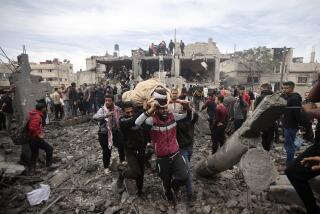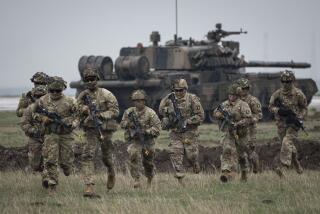NATO Now Faces a New Enemy--Time
- Share via
WASHINGTON — Through 10 weeks of relentless bombing, the United States and its allies endlessly repeated the conditions for ending the conflict over Kosovo. But when Yugoslav President Slobodan Milosevic said Thursday that he would accept its demands, NATO was surprisingly unprepared for success.
If Milosevic pulls his troops out of Kosovo within days, NATO will have no more time than that to deploy a peacekeeping force that is not yet fully assembled and for which planning is not yet complete.
Even more daunting, the North Atlantic Treaty Organization and the rest of the world community have not yet determined how the alliance-led peacekeeping force will relate to an international civilian administration in attempting to restore law and order and rebuild burned-out villages.
The head of the civilian operation has not yet been selected. Washington wants William Walker, a U.S. diplomat who was chief of the Kosovo Verification Mission, the unarmed force of observers deployed in Kosovo until NATO bombing started March 24. The European allies would prefer one of their own.
NATO’s stated objective throughout the bombing campaign was to create conditions allowing an estimated 1.5 million displaced ethnic Albanians to return to their homes in Kosovo. But on Thursday, a U.S. official said that it would be better if most of the refugees now in camps outside the province remain there, at least until mines could be cleared and the 700,000 or so displaced people within Kosovo were located, fed and allowed to go home.
The NATO force will also be required to disarm the rebel Kosovo Liberation Army, a task that many experts say will be extremely difficult if not impossible.
But ready or not, Kosovo is on the verge of becoming an internationally administered protectorate. For the foreseeable future the alliance and other international organizations will be in charge of everything from security to providing food, water and blankets in the Los Angeles County-sized province.
In theory, Kosovo will remain a part of Serbia, the dominant republic of Yugoslavia. In practice, however, the government in Belgrade will no longer be able to control the territory or its rebellious population.
NATO envisions a 47,900-strong peacekeeping force under a British general to reestablish security in Kosovo and assure refugees that they can return safely. The alliance is inviting Russia, Ukraine and dozens of other countries to contribute troops to the force, which will be under the auspices of the United Nations. The final structure of the force, as well as how the province will be rebuilt and run, has yet to be determined.
So far, only about 20,000 troops have been assembled in neighboring Macedonia and Albania. U.S. officials expect the force to be sent into Kosovo before it has been brought to full strength.
State Department spokesman James P. Rubin said the force, dubbed KFOR, will deploy in Kosovo as soon as a verified withdrawal of Serbian forces has begun.
“We believe the force can deploy very quickly,” Rubin said. “I am not going to give you a timeline for how many days after the beginning of the withdrawal, but certainly, I can tell you, very quickly.”
Although KFOR is modeled after the peacekeeping force sent to Bosnia-Herzegovina after the 1995 Dayton, Ohio, peace agreement, officials say its duties will be far different. The NATO-led force in Bosnia limited itself to a narrow band of military activities, mostly disarming and separating the warring factions, while leaving the more difficult job of restoring civil government to a civilian agency headed by former Swedish Prime Minister Carl Bildt.
“I don’t think separating forces would be an appropriate task because there will be no Serb forces because they will withdraw,” Rubin said. “So that is not the classic interpositional task of a peacekeeping force. I think it will have a number of functions on the civil side, on the engineering side, on the security side. . . . They will be working on re-creating conditions for the refugees to come back.”
But much of that rebuilding effort will have to wait until a civilian administrator is picked who can coordinate plans with the peacekeepers, and until details are hashed out with the Office of the U.N. High Commissioner for Refugees, the European Union, the Organization for Security and Cooperation in Europe and other groups. Many of these organizations have been drawing up contingency plans for weeks and have been waiting for a heavily armed peacekeeping force to accompany them back into the province.
Clearly the most physically daunting task will be rebuilding Kosovo’s shattered housing stock before the onset of winter, which arrives in the Balkans around October. Many villages were burned to the ground by Yugoslav forces, and other buildings were hit by NATO bombs.
The tent camps at the border might have to be replaced by hastily built tent cities and other temporary accommodation centers inside the devastated province, according to the U.N. refugee agency’s contingency plan.
Mike Mahdesian, an official of the U.S. Agency for International Development, said relief organizations hope to provide at least one warm and dry room in every house and apartment before winter. The rest of the rooms will have to be rebuilt later. U.N. agencies are ready to hand out plastic sheeting and timber for spot home repairs.
Mahdesian said relief organizations hope to be in Kosovo within a day or two of KFOR’s entry. He said AID and allied agencies have stockpiled enough food to feed those who were unable to reach Kosovo’s borders and who have been hiding in the hills for several months.
The internally displaced people “are the ones most in need,” Mahdesian said. “There are no camps and no host families for them. They are the ones that will need help soonest.”
As for the hundreds of thousands of refugees in camps along the border or relocated as far away as Los Angeles, Mahdesian said they should stay put for the time being.
But if refugees start spontaneously packing up and leaving, or if host countries try to force them out, the U.N. refugee agency and eight other groups will push hard to avert undue hardship for refugees and “operational chaos” for aid groups.
The U.N. agency would consider whether to provide fuel, fuel coupons or animal feed at strategic points of return. Free bus transportation would also eventually be instituted, with round-trip “look-and-see” trips offered to refugees.
Refugees would be given a “relief package” to meet basic food and sanitary needs while in transit and for a short while after their return. Information about avoiding land mines and other booby traps would also be distributed.
In the province, nearly every facet of ordinary life must be addressed, including food, water, electricity, roads and communications, the U.N. agencies said.
The entire spring planting season in March and April was largely missed, according to the U.N. Food and Agriculture Organization. Civil strife destroyed much of the 1998 harvest as well, leaving no extra stores of wheat or other vital food supplies.
Disarming the KLA will be difficult, many agree. Although the rebel force had previously agreed to turn in its weapons as part of a deal in which the Serbs would refrain from harassing ethnic Albanians in Kosovo, many nongovernment experts say KFOR might have to exert strong pressure before the KLA complies.
But Secretary of State Madeleine Albright said she is optimistic. “We have been in touch with various members of the Kosovar Albanian community, including the KLA,” Albright said. “It is our expectation that they will demilitarize.”
Ivo Daalder, the chief Balkans expert for the National Security Council during President Clinton’s first term, was not so sure.
“Despite what the agreement says, I find it inconceivable that the KLA will willingly disarm,” Daalder said. “I doubt if they will put all their eggs in the NATO basket. For every Kalashnikov that they hand in they will have five or six hidden somewhere else.”
Kempster reported from Washington and Wilson from Los Angeles.
More to Read
Sign up for Essential California
The most important California stories and recommendations in your inbox every morning.
You may occasionally receive promotional content from the Los Angeles Times.













